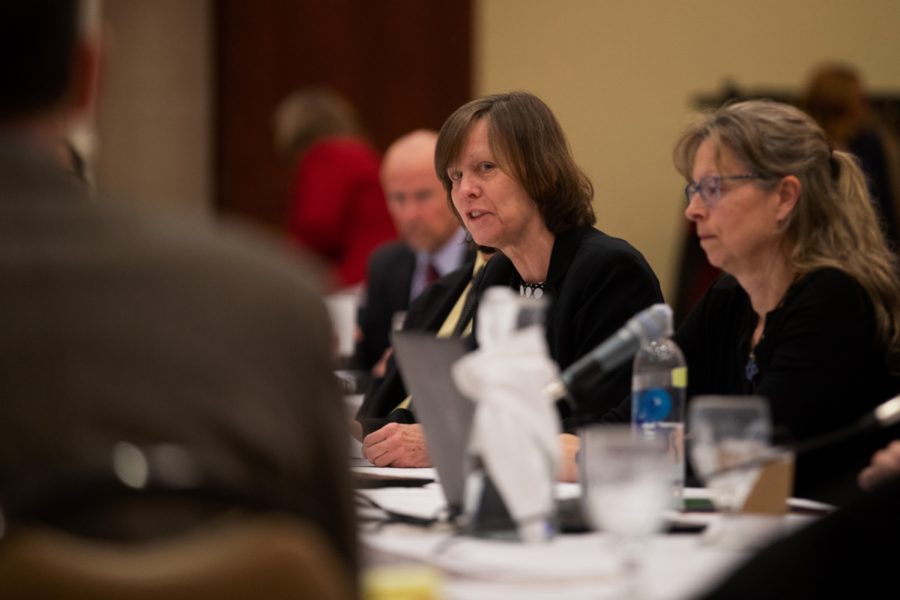UI faculty, staff continue to struggle with burnout
University of Iowa faculty and staff are continuing to struggle with burnout and productivity barriers as a result of the pandemic, according to Faculty Council meetings and the 2021 liveWELL report.
University of Iowa faculty senate president Teresa Marshall speaks during the Board of Regents meeting at the Alumni Center at Iowa State University on April 6, 2021. The Board of Regents looked over requests and plans from the University of Northern Iowa, Iowa State University, the Iowa school for the deaf, and the University of Iowa.
April 25, 2022
The University of Iowa Faculty Council and Senate are voicing concerns about burnout and poor mental health as the academic year comes to a close.
UI President Barbara Wilson told The Daily Iowan on April 20 that she will continue prioritizing mental health for faculty and staff.
Teresa Marshall, UI Faculty Senate president, said she heard from senators that they have been experiencing burnout and are struggling with mental health.
“I don’t think it matters what sector you’re working in — the last couple of years have been very difficult for individuals impacted by COVID,” Marshall said. “When you look at faculty, they’re not immune. We look at our faculty and staff on campus and they’re impacted like everyone else in our state.”
Marshall said she thinks faculty concerns about the university’s inability to require masks, vaccines, or workspace protection raised stress levels, which contributes to burnout.
“For people on the other side of the river, there’s constant changing of how I’m going to teach in person, remote, increase the workload, and they really haven’t gotten a break,” she said.
While on paper, faculty have enough time to complete all their work, Marshall said they can hit a level of burnout that stunts those daily activities.
When faculty continue to push themselves despite being stressed, their tasks may take longer because their brains are preoccupied with other worries like their families, she said.
“Kids, regardless of COVID, get ear infections and fall down the steps and break something, so there’s all that normal daily life that’s going on that also takes time,” Marshall said. “If you have young children, you want to be a parent. You want to be engaging with your kids and family, so that all just contributes to it.”
Marshall said she recommends faculty and staff use UI-provided mental health resources, like the Employee Assistance Program, and talk with their physician if necessary.
“I would encourage them to just take time for themselves, whatever they do, and take it easy on themselves, not be as demanding,” she said. “We all have high standards for performance, that’s how we end up getting here. Maybe relax those standards a little bit and give yourself grace.”
Bronwyn Threlkeld-Wiegand, director of the UI Employee Assistance Program, wrote in an email to the DI that the top reason people come to the Employee Assistance Program is to manage depression and anxiety. The second top reason is job stress.
“We are getting requests from departments and supervisors for presentations asking for help managing burnout,” she wrote. “We are also providing online resources for our faculty and staff, including resources for caring about yourself, caring about others, and overall mental health, which includes information about burnout.”
Threlkeld-Wiegand wrote the style of the appointments has changed since the beginning of the pandemic by switching to more telehealth options.
“The use of telehealth and telephone has enabled us to connect with people who would never have been able to get to our office in the past,” she wrote. “That has been a welcome improvement.”
Faculty can use services for free, she wrote.
RELATED: UI President Barbara Wilson continues prioritizing mental health, focuses on strategic plan
Well-being resources can also be accessed through the liveWELL program, which focuses on helping faculty and staff in their health and wellness efforts.
The 2021 UI liveWELL report, taken annually by UI faculty and staff to report on their overall well-being, was released earlier this year. The report detailed that UI faculty and staff have been experiencing an increase in productivity barriers and health risk behaviors since 2019-20, coinciding with their burnout complaints.
According to the report:
- 22 percent of faculty and staff experienced the health risk behavior of unmanaged stress, a seven percent increase from 2019
- 80 percent of respondents experienced the health risk behavior of poor nutrition, a four percent increase from 2019
- 35 percent of respondents experienced the health risk behavior of physical inactivity, a one percent increase from 2019
- 32 percent of respondents experienced the health risk behavior of poor sleep, a three percent increase from 2019
Along with the physical aspects of well-being that UI faculty and staff are struggling with, the report also found that they are struggling with concentration:
- 31 percent of faculty and staff had difficulty concentrating due to their caregiving responsibilities, a 7 percent increase from 2019.
- 56 percent of faculty and staff had difficulty concentrating due to feeling like they had too much to do, a 5 percent increase from 2019.
- 25 percent of faculty and staff had difficulty concentrating due to their own health or physical condition, a 7 percent increase from 2019.
- 29 percent of faculty and staff had difficulty concentrating due to financial stress, a 2 percent decrease from 2019.
In an interview with the DI, Wilson said UI human resources has been working on more mental health programs for university faculty and staff to combat issues like burnout.
“[HR goes] out to departments, they’ll work with different units around work-life balance issues, around stress releases, around the issues that you’re talking about,” Wilson said.
Part of the university’s challenge is making faculty and staff aware of the resources for both individual health and departmental health, she said.
“It’s there, I just think we got to connect the services with the people, and we’re working on that,” Wilson said. “I think it’s really important. We talk about student wellness and mental health all the time, and we often leave out our faculty and staff.”
Wilson said it’s important to pay attention to the mental health of all UI members, as students often rely on faculty.
“We’re a community and people can’t help each other unless they’re feeling strong and resilient themselves,” she said.
















